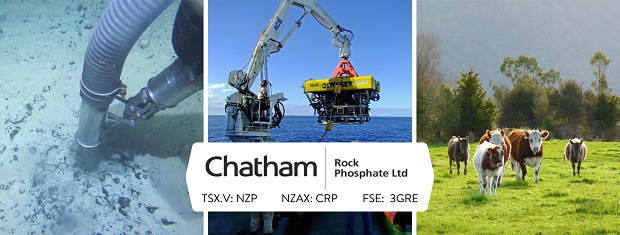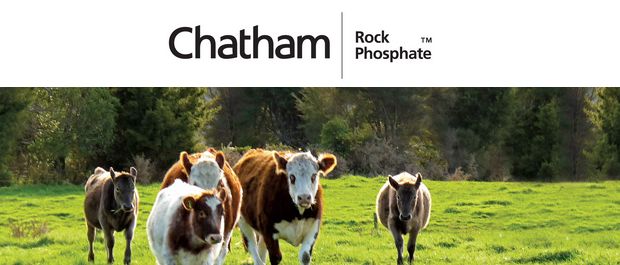Below is our recent interview with Chris Castle, Chief Executive Officer at Chatham Rock Phosphate:
Q: Could you provide our readers with a brief introduction to Chatham Rock Phosphate Limited?
A: Chatham Rock Phosphate (CRP) holds an offshore mining permit over part of the Chatham Rise with significant seabed deposits of rock phosphate. The Exclusive Economic Zone consenting regime came into force in June 2013 and CRP’s initial application was among the first considered by the Environmental Protection Authority. It was declined in 2015 and CRP is currently planning to resubmit when sufficient funding has been sourced, now expected to be in 2022.
CRP aims to be the premier supplier of direct application phosphate to the New Zealand and global agricultural sector. We are passionate about the benefits of direct application fertiliser to sustainable farming and agricultural practices.
The mining permit area covers 820 km2 of the ocean floor 450 km east of Christchurch, at a depth of around 400 metres. Estimated reserves are 23.4 million tonnes.
We are planning for an operational start two years after receipt of a Marine Consent and completion of a mining contract (to include arrangements for a vessel to undertake the mining).
 Recommended: Meet ReadyCloud – A Suite Of Connected Systems Designed To Improve The Way You Work
Recommended: Meet ReadyCloud – A Suite Of Connected Systems Designed To Improve The Way You Work
Q: You’ve recently closed a non-brokered private placement of 10,000,000 common shares; can you tell us something more?
A: This is the first time for at least the last five years that we have filled a private placement. However, it came as no surprise given the increase in investor interest in both markets where our shares trade. In New Zealand in particular trading is very active and is present at ten times historical average volumes.
Q: What is your mission?
A: Our objectives are to:
1. Achieve consent for the Chatham Rise project and develop the asset
2. Maximise value of the resource for NZ, including identifying and developing extraction methods for valuable rare earths contained in our permit area
3. Diversify our product mix to include other phosphate resources
4. Maintain our involvement at the forefront of the marine minerals sector to leverage our expertise as a project pioneer
5. Develop a pathway for CRP products for the agricultural and retail sectors
Q: What can we expect from Chatham Rock Phosphate Limited in the future?
A: We are presently in the process of merging with another phosphate company, Avenir Makatea.
This acquisition transforms Chatham’s investment profile and is a game changer for us for a number of reasons including:
1. It broadens our portfolio as we will no longer be reliant on a single, partially permitted New Zealand based marine phosphate deposit requiring a major cash injection to complete the final step
2. AM has made significant progress since getting started in 2011 and particularly so since we first considered investing back in 2015
3. The AM rock phosphate is a very high grade, low cadmium reactive phosphate, already certified in the Canada and USA markets as organic and which will attract a pricing premium
4. The AM mining costs are lower and rock prices are expected to be higher than for our project and hence the project economics are even more attractive
5. AM is well advanced in project finance discussions and has multiple parties competing for phosphate rock offtake agreements
6. It’s onshore so technology risks are reduced and environmental impacts will be small scale, very easily monitored and controlled
7. It’s a very simple, open cut mining operation which will also mine valuable dolomite rock (used for construction and roading) and food grade limestone as by products.
8. The project is based in a friendly jurisdiction where the permitting process will result in a single permit including environmental operating conditions
9. Extensive consultation during the last 9 years has resulted in local support from the landowners, the residents of Rangiora (the local Commune), and the French Polynesian administration
10. The costs and time frame to achieve fully permitted status are much less that for Chatham Rise project and the risk of being declined is lower
11. There are major community benefits as the mining process will rehabilitate a high proportion of the unusable land resulting from historic mining
12. The island of Makatea will also benefit from the construction of a new port , roads, housing, schools and other infrastructure
We expect the Avenir Makatea project to be fully permitted in 12 months and project development can then begin, leading quickly to strong operating cash flows which can then pay for the Chatham Rise marine consent permitting process.
 Recommended: Triple W Develops DFree, The First Wearable Device To Predict When You Need To Go To The Bathroom
Recommended: Triple W Develops DFree, The First Wearable Device To Predict When You Need To Go To The Bathroom
Q: What’s the best thing about Chatham Rock Phosphate Limited that people might not know about?
A: Our company is an outstanding example of an environmentally focused provider of fertiliser that is required to feed the growing world population. Direct benefits of using our rock included water and soil quality, reduced carbon emissions and food safety benefits. And the operational environmental impacts of operating in the ocean are lower than mining phosphate on land.
To be more specific:
Water quality – when Chatham rock phosphate applied to the soil in its natural form there is 80% to 90% less run off into waterways due to its slow release characteristics.
Improved soil health – Chatham rock phosphate (a reactive phosphate rock or RPR) works with plant root eco-systems. Manufactured fertilisers tend to bypass these and feed the top of the plant directly. As a result the plant root eco-systems atrophy over time and the soils become inert.
There are significantly reduced (90% lower) carbon emissions due to closer location to market and less frequent application to the land as a result of the slow release.
Chatham rock contains approximately 2 ppm cadmium, ultra-low by world standards. Most of the major exporting countries have levels well over 60 ppm. The EU has just introduced a limit of 60 ppm eventually falling to 20ppm. (see cadmium slide P24). Cadmium accumulates in red meat and is directly linked to cancer in humans.
Activate Social Media:


